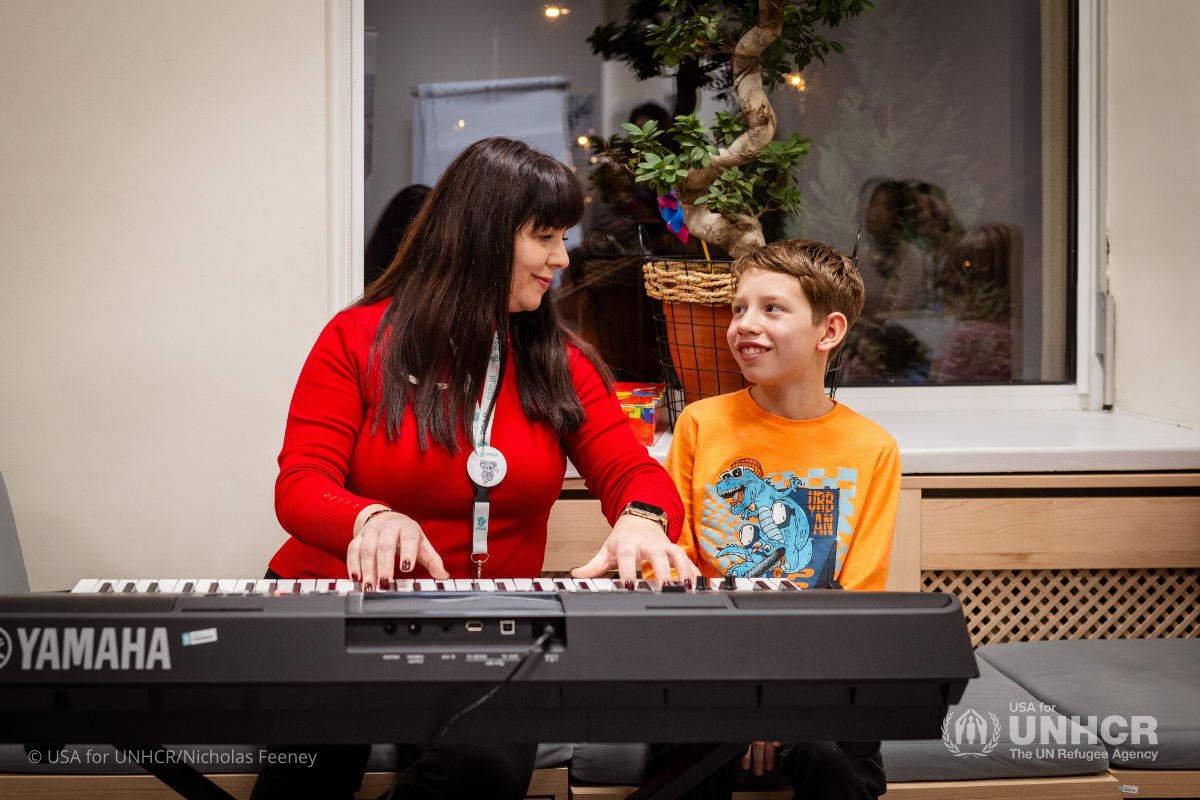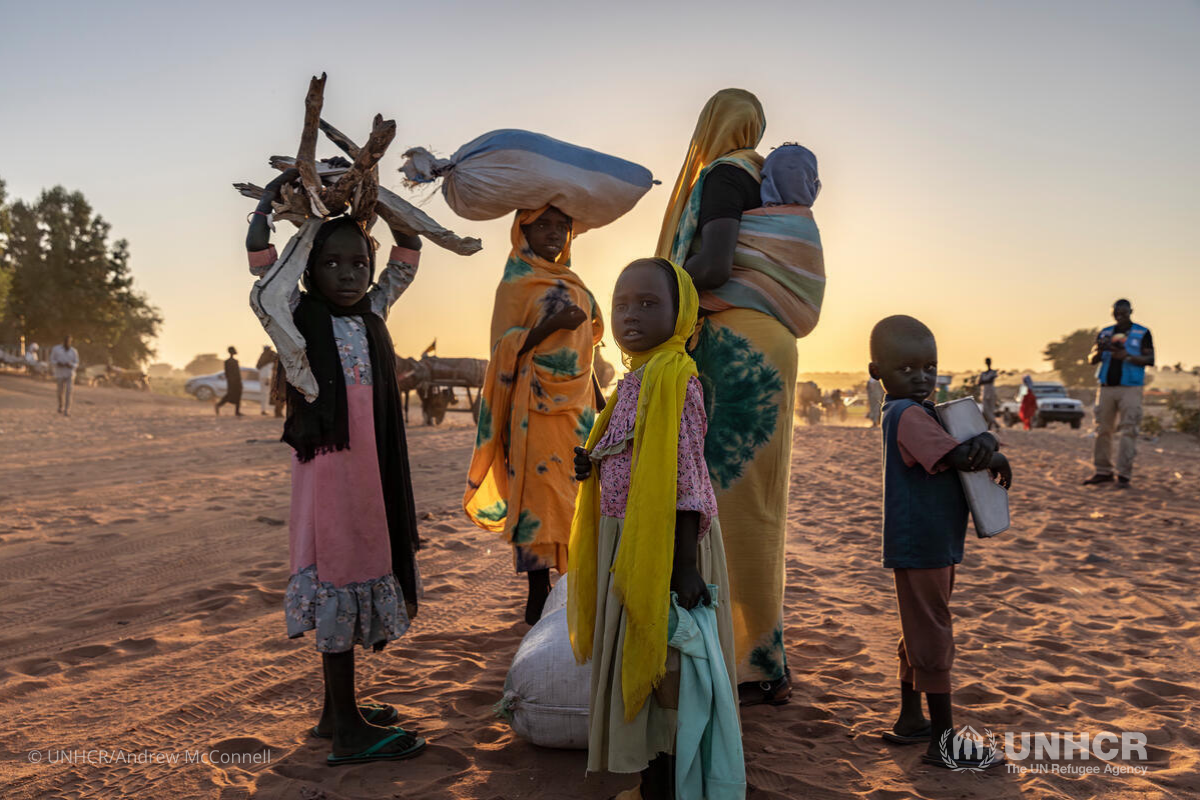Three Americans working on the frontline of UNHCR’s refugee response in Poland
February 24 marks three years since Russia’s full-scale invasion of Ukraine, causing the largest refugee emergency in Europe since World War II. UNHCR teams on the ground have been providing protection and care to refugees since day one. Poland has welcomed the greatest number of refugees from Ukraine, welcoming nearly 60 percent of all refugees from Ukraine. American citizens are among those working on the frontlines of the refugee response in Poland. Hear from three American UNHCR staff members about what motivates them to serve refugees and why support for Ukrainians remains critical.
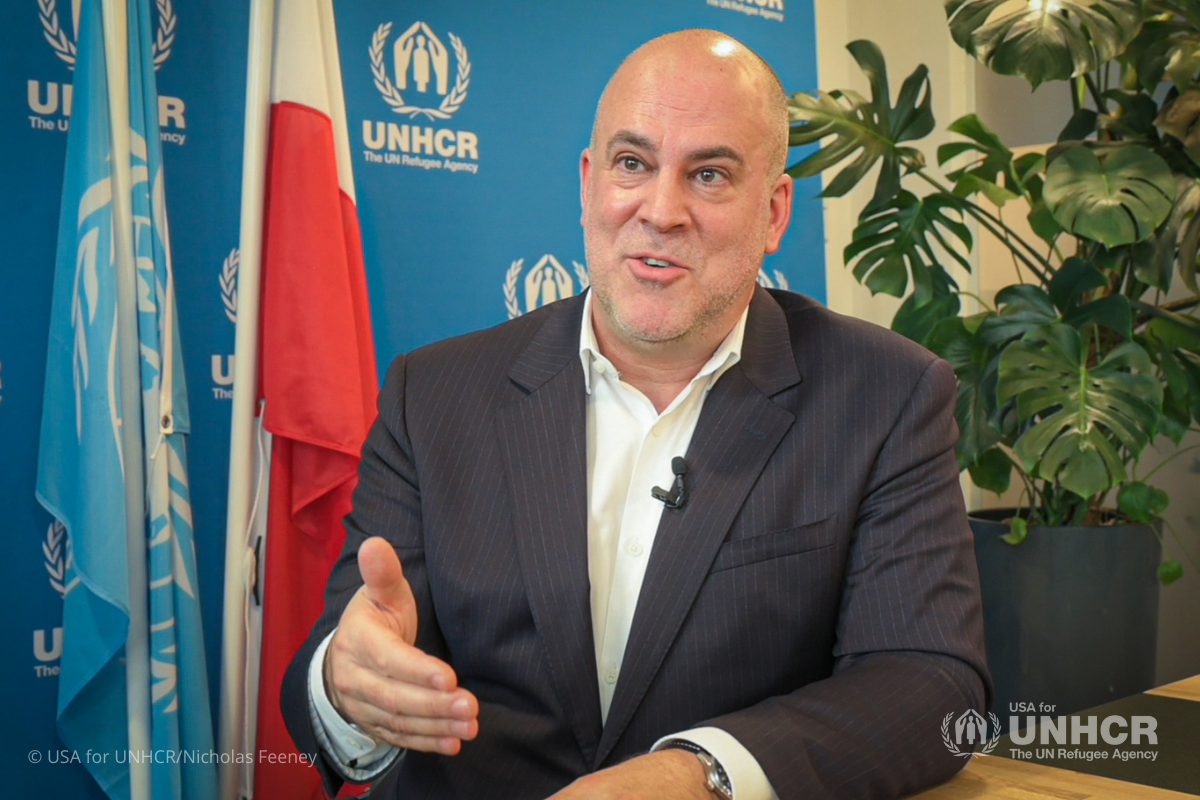
Kevin Allen
UNHCR Representative in Poland, and Colorado native
Can you share about your background and your path to working for UNHCR?
I grew up in Colorado on a wheat farm where very few people have ever heard of UNHCR. What ultimately drove me to UNHCR was a desire to engage in public service. That path initially led me to the Marine Corps, then to the Peace Corps, and ultimately to international humanitarian work.
I wasn't sure my military background would be welcome or even something I should talk about when I first joined UNHCR. But when I worked in high-risk duty stations like Afghanistan, for example, with a big operational component, I found that a lot of the things I learned in the military, like teamwork, coordination, operations, and management, were in some ways similar to work I was undertaking at UNHCR. It was a different objective, and at the same time, I think the military experience gave me insights and intuitions into working where it can be dangerous. So, strangely, it's been an asset for me. It's not a typical path to go from the Marine Corps to the Peace Corps to UNHCR, but that was my path.
What is your role in the Ukraine refugee response in Poland?
I manage UNHCR’s overall operation in Poland and arrived shortly after the full-scale Russian invasion of Ukraine back in 2022. The operation here is somewhat unique in that we're situated within the European Union, in Poland, which did an exceptional job of receiving millions and millions of refugees across the border.
Our job is to make sure that people get the protection and the legal status that they merit after fleeing persecution and war and then to help the most vulnerable, the refugees in the shadows who may fall through the cracks. The most important thing we can do at this juncture is to invest in the human capital of Ukrainian refugees for the future, hoping that there will be peace one day.
Why is continued support for the Ukrainian refugee response so important?
When we talk about over 6 million Ukrainians who fled Ukraine, they did not flee because of internal conflict or persecution. They fled because a foreign power invaded their country. It’s more important than ever for people to remain engaged and not to forget Ukraine or the Ukrainian people. So much is at stake. It's important that UNHCR stands with the people of Ukraine, that we stand with those who were forced to flee and do whatever we can to help build their resilience and support the strength that they have so that hopefully they can go back one day and rebuild Ukraine.
One thing that I always advocate is for people to hear directly from people with the lived experience of being displaced. What does an actual human being who is forced to flee their home in the middle of the night at gunpoint face and feel? That's relevant, that's real, that's morally significant. And I think it's important that we sometimes cut through the facts and the figures and the bureaucracy and the politics and really keep our eye on what is the heart of the matter here, and that is individual human beings who are forced to flee.
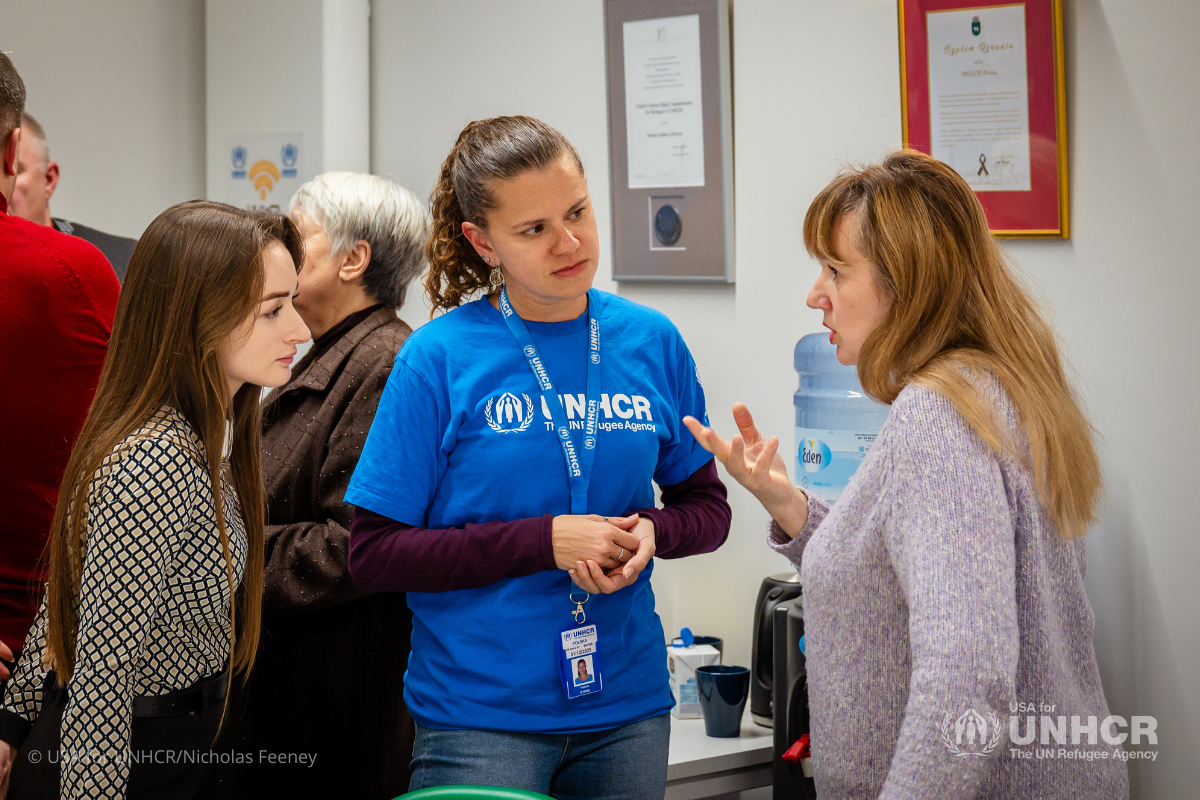
Felicia Byrne
UNHCR protection officer, and Illinois native
What inspired you to seek a career serving refugees?
I've always been interested in migration issues. It was sparked when I was 17 and working at California Pizza Kitchen. I spoke with many of the cooks and the cleaners, and they had migrated [to the U.S.], and I was very interested in why people would leave their country.
After college, I started working for an immigration attorney in Chicago. That's when I heard about the reality of asylum seekers and refugees and learned about UNHCR. I told myself, "Okay, I want to work for UNHCR," so I put a plan together and got my master's degree in international public service.
After graduate school, I worked in Tanzania for a demining organization and in Egypt with a volunteer organization supporting asylum seekers. I moved to Kenya to work for the U.S. Resettlement Support Center, the intermediary between UNHCR and the U.S. government. I did thousands of interviews with refugees who were recommended for resettlement to the U.S. In 2015 I joined UNHCR as a junior professional officer in Kakuma refugee camp in Kenya. I've been working for UNHCR ever since. It had always been my dream. I took a roundabout way to get here, but I did it.
What is your role in the Ukraine refugee response in Poland?
I'm a protection officer, and I coordinate UNHCR's protection activities with our partners in Lublin, Poland. I lead protection monitoring activities such as interviewing refugees to understand their needs and challenges. I regularly engage with Polish border guards to understand the dynamics at the border.
I try to ensure that everyone has access to their legal rights, healthcare, mental health and psychosocial support, and education, and that they know where to go for additional information and support services. I also conduct extensive training on protection and humanitarian standards with local authorities, NGOs, and anyone working in the refugee response space.
What success are you proud of from your work in Poland?
One of the biggest successes is organizing a refugee community reference group that started in April 2023. It's a very motivated group of refugees, and we meet with them regularly to hear their voices and concerns and consult with them on UNHCR's programming and activities. We get their feedback and suggestions on what we can change.
In one program, the Making Friends initiative, we've adapted the program and the way we communicate based on the feedback of the community reference group. Through these changes, we’ve increased the number of people enrolling in the program. It's a great success where you see the theory of community-based protection and accountability with direct refugee involvement in the programming and activity of an initiative.
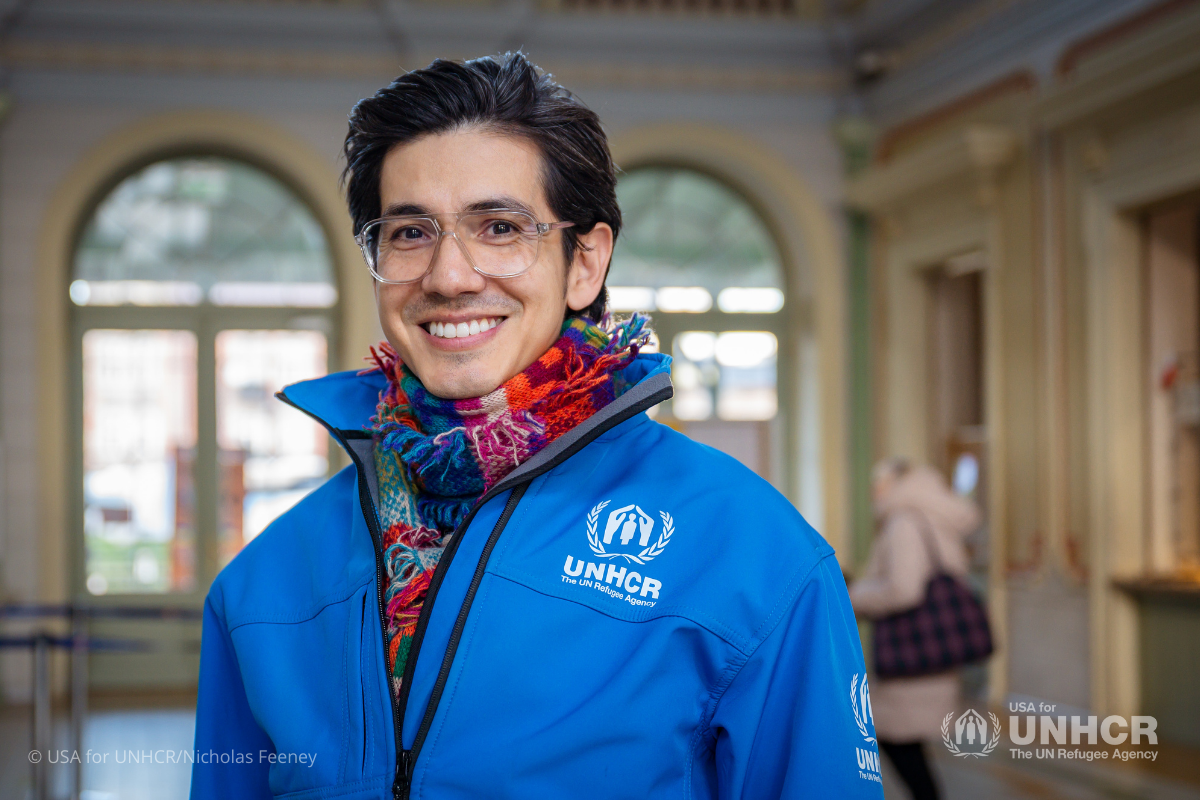
Jose Luis Hernandez
UNHCR protection officer, and Texas native
What first sparked your interest in human rights issues?
As a child, I remember watching a television commercial about human rights. There was a magician showing a rabbit in a hat. Then he covered the hat and made the rabbit disappear. He then made a few other things disappear. Finally, he had the Universal Declaration of Human Rights, and he put the declaration in the hat, but he couldn't make it disappear. The magician was saying that nobody can take away your human rights and nobody can make them disappear.
I was just a kid at the time, and I didn't fully understand, but I knew that I had certain rights because the commercial mentioned that children have rights and that you have the right to go to school. You have the right to live in peace. It was something that really connected with me. So all my life, I have always thought about human rights and how it's something that all people deserve.
What is your role in the refugee response in Poland?
I've been working in the refugee response since June 2022. I started first on child protection issues, focusing on strengthening the capacities of the national and local governments to respond to children coming from Ukraine. One of the first things we worked on was ensuring that all the humanitarian actors in the southeastern region of Poland knew what to do when they saw, for example, an unaccompanied or separated child.
Now, as a protection officer, I manage a protection team at the Przemyśl train station [near the Ukraine border] who are speaking to refugees every day so that we know what their needs are. These interviews with refugees are important for our response as the needs of refugees arriving today are different than in 2022. Now we see people with more vulnerabilities, so we need to ensure we are able to attend to these vulnerabilities.
Why is it so important to hear directly from refugees about their experiences?
You should listen to their stories and hear the resilience they have. Even in the worst of times, we all need to maintain our human rights and we all deserve to live without fear of persecution and fear of violence. Hear their stories and hear how all they want is to live in peace. That's the message that I would send. They want to survive. It's the most basic of our human instincts. I’m working to ensure that refugees have the same rights as you and I have.
How can you help...
UNHCR, the UN Refugee Agency, supports refugees who have been forced to flee violence, war and persecution. Our donors help refugees in their greatest time of need with shelter, food, water and medical care, and their support builds awareness for resettled refugees living in the U.S. With your help, more refugees will have the opportunity to build peaceful lives and give their families a bright future.
